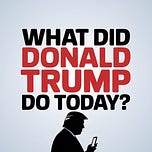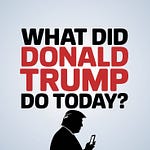The recent flurry of public statements and testimony from members of the Trump administration paints a troubling picture of a government increasingly shaped by political theater, misinformation, and authoritarian impulses. Donald Trump’s Truth Social post exemplified this trend with a barrage of baseless accusations against Joe Biden, including unfounded claims about “open borders,” Biden’s cognitive fitness, and conspiratorial assertions about a shadow government using the “Autopen.” His use of racially charged language to describe immigrants and vague threats against political opponents suggested a continued flirtation with incitement and demagoguery. Similarly, Trump’s announcement of the “Golden Dome” missile defense shield was steeped in exaggerated claims and dubious financial justifications, offering no credible technical or strategic detail. The event resembled a campaign rally more than a policy briefing, laden with self-congratulatory tangents, mythologizing references to Reagan, and an alarming disregard for arms race implications or military planning norms.
Karoline Leavitt’s “Take Our Sons and Daughters to Work Day” briefing further showcased the administration’s penchant for using official platforms to disseminate propaganda. Marketed as civic education, the event was in reality a sanitized performance glorifying Trump and promoting falsehoods—from border security to climate policy—presented through child-friendly soundbites. Leavitt’s misleading claims, partisan snark, and use of children as political props undermined the integrity of the press briefing and turned an educational opportunity into a MAGA-brand loyalty exercise.
Meanwhile, Secretary of State Marco Rubio’s Senate testimony revealed the incoherence and ethical erosion of the administration’s foreign policy. While praised by Republicans for pursuing “efficiency,” Rubio’s defense of steep foreign aid cuts, rhetorical hostility to career diplomats, and evasive answers on Ukraine, Sudan, and China exposed an erratic, ideologically driven strategy. His minimization of U.S. credibility concerns, refusal to address Trump’s business entanglements, and endorsement of racially selective refugee policies fueled bipartisan alarm over the abandonment of diplomatic norms and human rights standards.
Secretary of Homeland Security Kristi Noem’s testimony echoed these patterns, as she promoted extreme interpretations of executive power and dodged accountability for rights violations under aggressive immigration enforcement. Her claims about habeas corpus, domestic surveillance expansion, and FEMA restructuring were legally dubious and ideologically extreme. Allegations of wrongful deportations, including of children undergoing medical care, went unanswered, while financial irregularities and use of DHS resources for political purposes added to growing oversight concerns.
Finally, Secretary of Health and Human Services Robert F. Kennedy Jr.’s Senate hearing showcased a radical restructuring of HHS grounded in ideology rather than science. His sweeping budget cuts, elimination of equity-focused programs, and opaque management style alarmed lawmakers from both parties. Kennedy’s refusal to implement appropriated funds, dismissal of oversight obligations, and revival of anti-vaccine rhetoric underscored his divergence from evidence-based governance. While he framed his agenda as reformist, the reality was a chaotic and unilateral dismantling of public health infrastructure with profound consequences for research, healthcare access, and agency morale.
Together, these events reflect a Trump administration unmoored from institutional accountability and deeply invested in consolidating power through spectacle, misinformation, and policy disruption. The collective testimony and public statements revealed a government in which loyalty, ideology, and performative nationalism increasingly trump legality, expertise, and public service.













Share this post